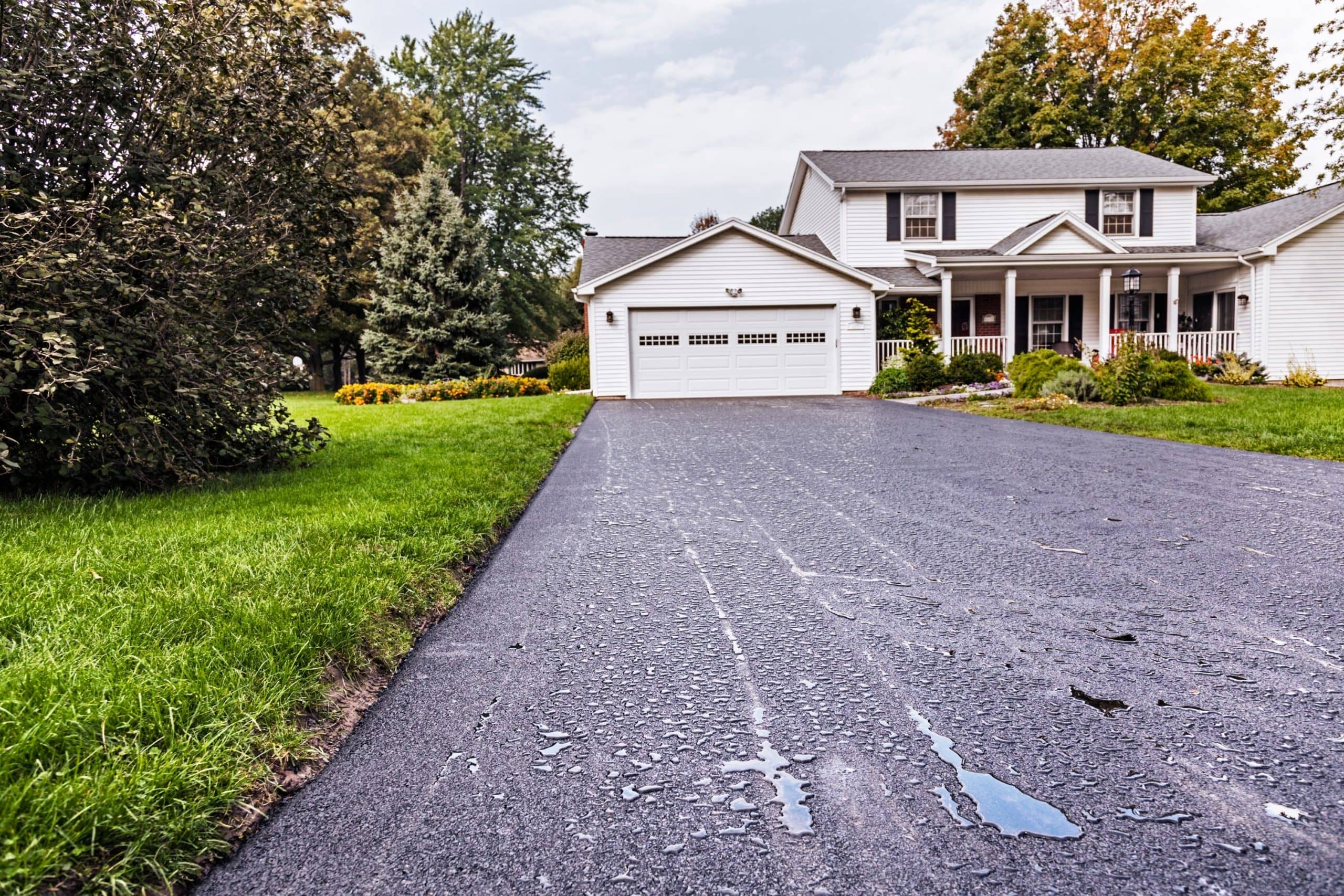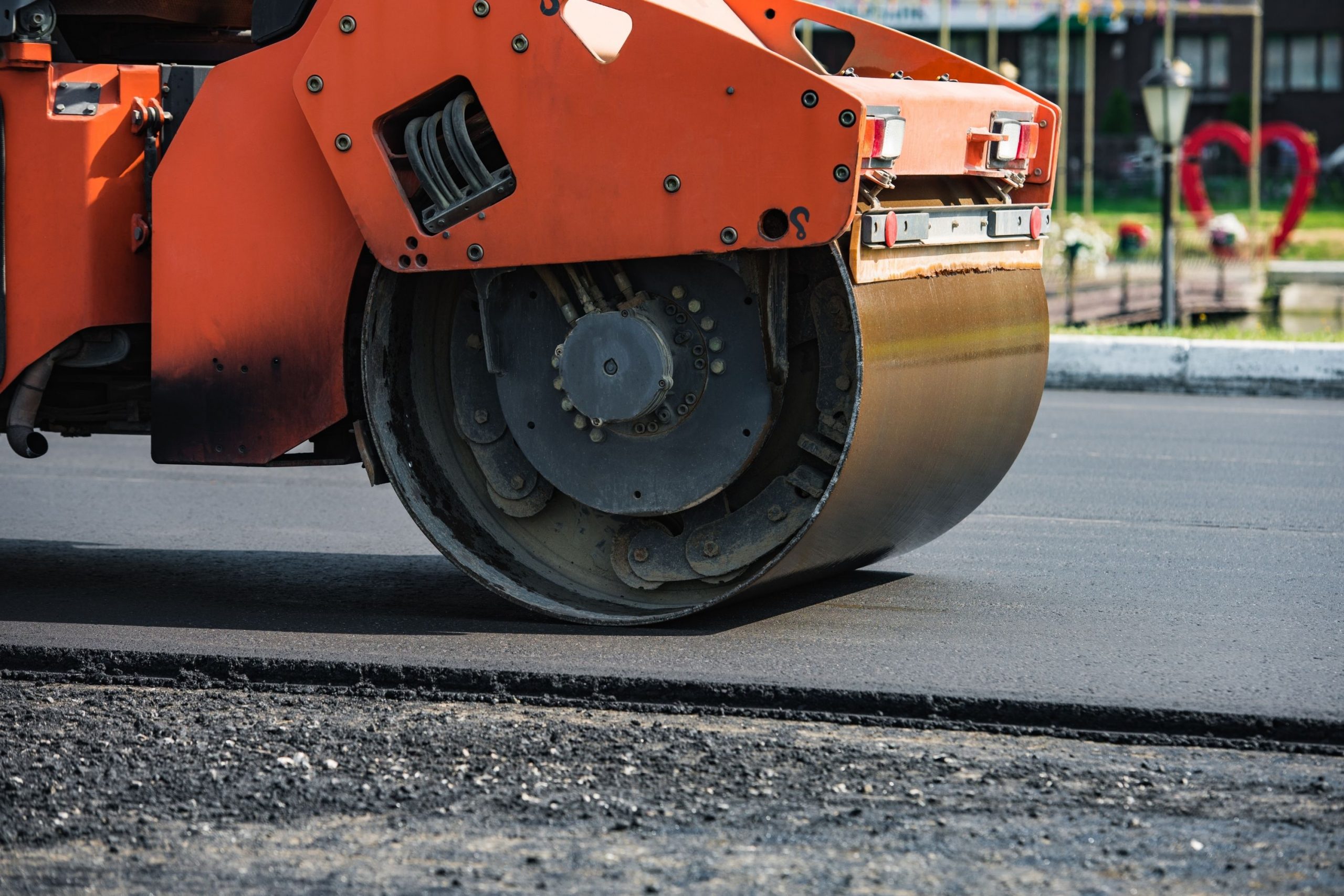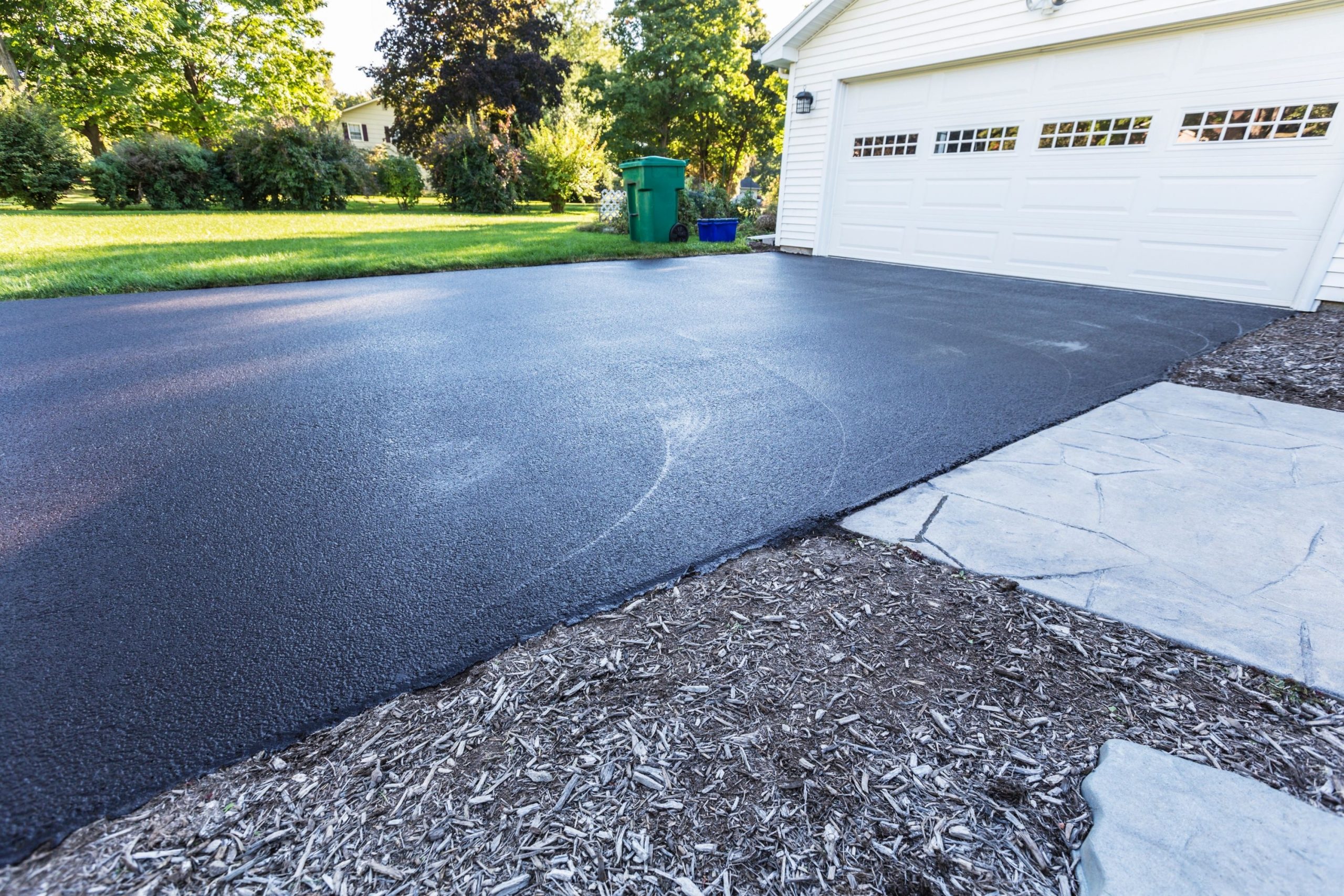Having a smooth and good looking asphalt driveway is something that every homeowner is proud of! And besides, a smooth road with an even and flat surface is a guarantee that your car’s wheels will not suffer when moving on it.
However, when you decide to buy a driveway made of asphalt, you will surely sooner or later ask yourself one simple question: how long does an asphalt driveway last at all? Does it make sense to use this specific material for the road that is going to be used really very frequently?
This is why we decided to make an investigation and find out more about an asphalt lifespan, as well as figure out how effective this material is when being used for a driveway.
How Long Should an Asphalt Driveway Last?
To make it really short, if we compare the lifespan of a concrete driveway and the duration of an asphalt driveway life, we will see that asphalt is a way more durable and long lasting stuff! In general, as a driveway material, asphalt implies quite a wide range of years. Most of the paving made of it will be able to easily last for ten years on average, or even longer.
Of course, if you buy a driveway that is made of low-quality asphalt, it will hardly reach the limit of twenty years. But since most of them have been carefully balanced and selected to ensure that it is not just easy to install but it is also strong enough to serve your home for a long time, you can be sure that your asphalt driveway will stay right where you install it for decades!
So no wonder that the majority of this kind of driveways report their roads last for up to forty years, and sometimes even longer. Since an average asphalt lifespan is approximately thirty to forty years, if your driveway is properly maintained, it will serve you much longer than that.
Such longevity of this material is also a reason why people prefer asphalt rather than concrete.
See, a concrete driveway may develop cracks pretty soon after being installed, all because of the influence of cold, water, and other destructive external factors. Concrete may also be able to last long, but only if it is a high-quality one. Besides, it is more complicated in terms of maintenance.
But even if you choose to install an asphalt driveway, don’t get charmed too much! It can also suffer from weather conditions, this is why it is recommended to keep an eye on it to notice the very first signs of damage in time and fix them.

Factors That Affect Your Asphalt Driveway Lifespan
Of course, asphalt is a durable stuff and an asphalt road can easily last the lifespan of your home! However, it does not mean such a driveway needs no care and maintenance.
There are a few destructive factors that can decrease your asphalt road’s lifespan quite significantly. If this material gets damaged, it will become more prone to breakage, cracks, and other problems and surface issues. So what shall you be aware of in order to keep your asphalt driveway smooth and even?
- Weather conditions
- High heat
- Heavy weight
- Proper installation
- Type of usage (residential or commercial)
As for the weather, heavy or simply frequent rains may lead to your asphalt weakening and wearing out since water will get absorbed into its surface and make the material soften. In addition, cold and frigid temperatures may lead to asphalt cracks and contracts.
High heat can make asphalt way too soft leading to its weakening. And even though this scenario is only possible in extreme heat, even during a very hot summer your asphalt driveway is under a potential threat of softening.
Also, heavy weight is another factor that can lead to the material’s damage and thus to the problems with asphalt surface. When being exposed to an extreme heaviness, asphalt will wear out much faster.
The asphalt driveway installation process is rather complicated and complex, so naturally, it must be done correctly. Like this, you will be sure that you will get most of it in the long term. This is why it is crucially important that your new driveway is being installed by the professional contractor. In this case, it will be correctly graded to drain water easily, and the area will be raked for removing dirt and debris in order to level the surface. Also, it is a guarantee that your asphalt driveway will be protected from cracking and shifting.
By the way, the type of asphalt road usage also matters! That’s because it refers to the type and weight of vehicles that will be parked on the driveway. Depending on that, the thickness and the aggregate foundation may vary.
For instance, a residential driveway must be at least three inches thick to withstand cars, vans, and lightweight trucks. However, for heavier vehicles (e.g. campers, trailers, weighty trucks, etc.), the asphalt must be at least 4-5 inches thick.
This is why it is important that you take care of your asphalt driveway properly to make sure it lasts longer.
What Can You Do to Make Your Asphalt Driveway Serve You Longer?
Maintaining your asphalt driveway may seem to be a very difficult task to perform. And to a certain point, it will take a certain effort, of course. This is why, if you want to install an asphalt driveway or you are interested in this specific material, we recommend you take into account that proper care and maintenance will be needed. Like this, your asphalt will serve you for decades easily, and installing driveway lights may help the surface better.
So what shall be done in order to make sure the asphalt surface is (and will be) in a good state?
- In summer, water your asphalt driveway so that the temperature of the surface remains more or less the same. No daily watering is needed though since it will have completely the opposite effect!
- Change your parking spot on your driveway regularly. Using the same parking spot all the time may cause damage by stressing out this area.
- Try to shift the position of your car or whatever vehicle you have every few days or so.
- Never put heavy objects on your asphalt driveway for long. By saying heavy we mean everything that is more weighty than a car. Otherwise, the surface will get damaged pretty soon.
- After installation, let your new driveway cure for at least 72 hours before you start using it.
- Inspect your asphalt driveway regularly for cracks and repair them quickly.
- Don’t park vehicles that are leaking fluids like oil or gasoline on your driveway. Oil can degrade the petroleum in the asphalt. And in general, these types of leaks lead to damage that may result in early driveway repairs.
- For ice removal in winter, rock salt is safe to use on asphalt.
These recommendations are very easy to follow and implement, they require no special tools or equipment, as well as no skills or specific experience from you. They are also simple to upgrade and simple to manage.
But thanks to them, you will be able to effortlessly keep your asphalt driveway smooth and good-looking longer and add years to its service.

What Are the Pros And Cons Of Asphalt Driveways?
Of course, if you want your driveway to look nice longer, you will want to learn as much about this material as possible. This is why homeowners often ask about benefits and negative sides of asphalt as a driveway material.
As for the pros, we can name the following:
- It is flexible which means asphalt is more cracks-resistant than concrete, for instance.
- Its installation costs less (one square foot of asphalt installation will cost between 3 to 4 dollars. Concrete will cost from 5 to 7 bucks).
- Winter-hardiness of asphalt allows it to withstand harsh weather conditions better.
- Asphalt is quicker to install.
- You can renew or repair it yourself.
However, there are also certain negative aspects that you must be aware of in advance. Like this, you will be able to define for sure whether asphalt is the material you really need for your driveway, or not.
- It has limited design options since asphalt is always flat, smooth, and black.
- Its edges can look unfinished unless you do something to them.
- When an overheated, black component in asphalt may become sticky.
- Asphalt must be resealed regularly to extend its life.
- It can easily be damaged by the trees’ roots or plants.
So now you know what makes asphalt so welcome as a driveway material, as well as what negative features it has. We told you what can make this kind of surface get easily damaged as well, so from now on, you will be able to take care of your driveway properly.
[wp-faq-schema title=”Frequently Asked Questions”]

I need to install a driveway, but when I began to choose the material, I stumbled upon one issue. What is the difference between asphalt and blacktop? Are they different materials?
No, as far as I know, they are not. If I recall it correctly, asphalt usually refers to the roads like major highways, streets, etc. On the other hand, blacktop is the word that’s usually used for driveways and other residential roads.
How long does an asphalt driveway last when sealed every year? I heard that this material needs to be reinstalled often enough to be able to last for decades. But how frequently is that often?
Well, if you seal it annually, I believe it will easily last for 30 or even 40 years if not longer! Your grandchildren may even inherit it! As for the frequency of reinstallation, I guess it depends on how fast your driveways gets worn out.
How much does an asphalt driveway cost per square foot?
Typically, the price for a square foot would be from $7 to $13 for an asphalt driveway.
I’m thinking about pouring a concrete driveway, but I have an issue. I don’t know how long it can last. How long does a concrete driveway last, folks? Does anyone know?
As far as I know, concrete driveways are pretty durable and can last for 20-30 years. I guess this lifespan will be shorter if you have several vehicles in your family and you use the driveway very often though.
How long does asphalt last compared to concrete? I need to choose the material for my driveway, but I can’t decide which material will work best.
I know for sure that asphalt will last less. If I remember it correctly, with proper maintenance, an asphalt driveway can last about 30 years. Alternatively, concrete is more sturdy and long-lasting, and can last for 50 years or more!
Hi! Can you please tell me how long asphalt driveway will take to dry after some minor repairs?
Hello! Typically, new asphalt dries completely in 72 hours. But you must not start using it again sooner than after 48 hours anyway!
How long do asphalt roofs last? Is it a worthy roofing material?
I guess it’s quite durable and worthy. If properly installed and maintained, such roofs can last for at least 15 years. The longest lifespan I know is about 30 years.
How long does asphalt take to dry after it is installed? We need to reinstall our driveway, but since we use it daily, I’d like to know how long we won’t be able to drive on it.
You will have to wait for at least 48 hours. But 72 hours is the best to ensure the driveway is fully dry and can be safely used again with no risk of damaging it.
Hello. Could you please tell me how much an asphalt driveway replacement might cost?
Hello. If there’s no need for dramatic leveling or grading, a new asphalt driveway might cost $7 to $13 per square foot, including installation.